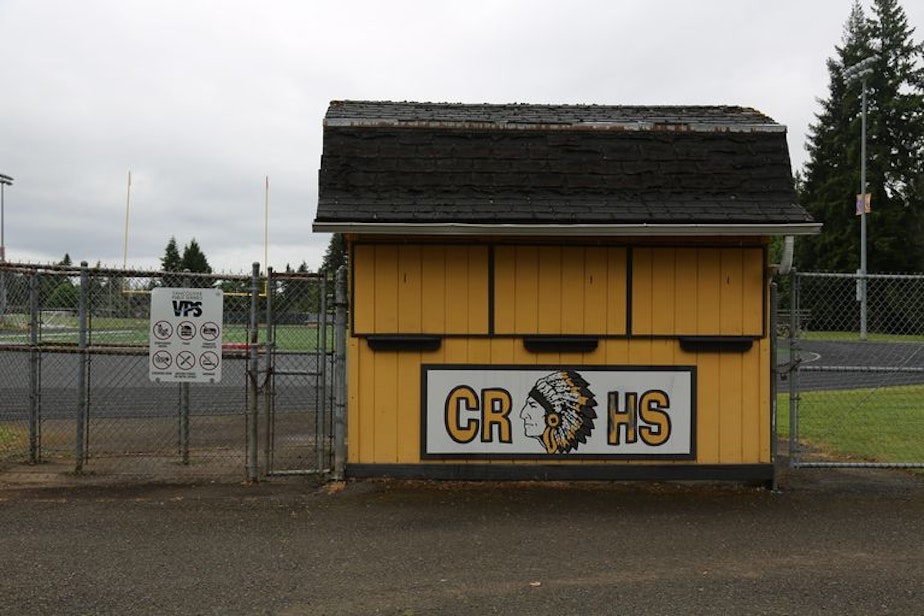New momentum to retire Native-themed mascots at Washington state schools

One of the first Native American women elected to the Washington State House of Representatives says she is drafting legislation to retire Native-themed mascots and team names at public schools.
This has been a goal of Native American leaders for a while, but has new-found momentum in the wake of the Washington, DC, NFL football team’s name change.
Around two dozen high schools in Washington state currently use Native American-related mascots or nicknames -- most commonly Indians, Warriors and Braves.
Democratic state Rep. Debra Lekanoff said derogatory nicknames and stereotypical caricatures of Native Americans cause lasting hurt.
"We’re being portrayed as no different than a token and no different than a tiger or a duck," Lekanoff said in an interview Thursday. "In 15 to 20, 50 or 100 years, when they look back at our bills and how we treated one another, they'll look at this bill and say, 'It was just a little bill, but it brought some hope and respect for all.' It's good to heal."
The move to phase out Native-themed mascots is "long overdue," according to a panel of Native education leaders who spoke to the Washington State Board of Education on Thursday.
Sponsored
"One of the most degrading things for us as Native people is to see a non-Native running around in our regalia with their face painted and they're war whooping or they're chanting," said Nisqually Tribal Council member Willie Frank III. "That's tough to see."
"I'm hoping that going into 2021 we'll see a lot more changes and a lot more schools stepping up," Frank concluded.
The Washington State Board of Education has twice passed non-binding resolutions urging schools to discontinue the use of Native American mascots. Passage of the resolutions in 1993 and 2012 resulted in some schools voluntarily adopting new identities while dozens of others decided to stay the course.
By contrast, the Oregon Board of Education had the authority to mandate that public schools drop Native American mascots unless they got their local tribes' approval and incorporated more tribal history in their curriculums. In the wake of a state directive passed in 2015, the 16 affected Oregon districts took different tacks with some changing their nicknames and others reaching deals with nearby tribal governments.
At the college level, the NCAA made member schools drop such mascots more than a decade ago, with exceptions like the University of Florida Seminoles, the Utah Utes and the University of Illinois Fightin’ Illini, where the tribes and universities have agreements in place for respectful usage.
Sponsored
Lekanoff said the details of her new Washington state legislative proposal, which would have force of law, are still being worked out, including whether to make similar exceptions for mascots and team names that have approval from the nearest tribe.
Lekanoff said she personally had no problem with Bellingham High School keeping the mascot of Red Raiders, since the nearby Lummi Nation had been consulted about the name. The school district changed the mascot image for the Red Raiders in 2000 from a chief in a feathered war bonnet to a bird of prey.
The state representative said respect for tribal sovereignty would also lead her to tread carefully around possibly forcing Wellpinit High School on the Spokane Indian Reservation to drop its Redskins team name.
In 2016, a Washington state Senator introduced a bill that singled out just the term “Redskins” as unacceptable for public school mascots and athletic teams. The measure died in committee. It contained an exemption for schools located in Indian Country.
In the past couple of weeks, several southwest Washington school boards have taken action to change problematic mascots ahead of possible state mandates.
Sponsored
The Vancouver, Washington, school board voted unanimously last week to retire the Chieftains nickname and mascot for Columbia River High School and Minnehaha Elementary School. No replacement was immediately presented.
As has happened elsewhere when this issue came up, school board members received testimony in opposition from some alumni who expressed pride in the Chieftains name and did not view it as offensive. To the contrary, the alums said the use of the name and imagery honored Native Americans.
During a virtual meeting Monday, the Kalama School Board directed their district superintendent to explore a new logo image to replace Charlie Chinook. The school mascot started out long ago as a cartoonish caricature of a Native American man holding a scalp and tomahawk. The likeness was more recently toned down and repeatedly redrawn only to be completely phased out now. The high school’s athletic teams are named the Chinooks, after the lower Columbia River tribe of that name.
Editor's note, 9/25/20. This story has been corrected to say that Rep. Lekanoff is one of the first Native Americans to serve in the Washington House. Our initial version said she was the first Native American woman in the House based on information from the Washington state House Democratic Caucus, which has since updated their guidance. The caucus says the late former Rep. Lois Stratton of Spokane was the first such woman.
Copyright 2020 Northwest News Network

